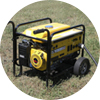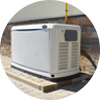Disclaimer: This blog was written during a power outage.
Natural disasters happen. Power outages happen. The U.S. experiences 3,000 power outages per year, affecting at least 41 million people. And while natural disasters are out of your realm of control, you can control the severity of a power outage – to a certain extent.
Home generators can keep you plugged in when your power lines are down. So if your power goes out, you will have another source of energy. With the average power outage lasting roughly 3.5 hours it is key to be prepared in the case of a power outage. Just like you would prepare for a tornado or hurricane, you should also plan for a limited electric supply during and after a storm. By having a backup generator before a storm, you do not have to worry about calling your electric company and trying to fight the masses to get the company’s attention to fix your outage.
Type of Generators
 Portable Generators – These generators are typically run by fuel and are the least expensive type of generator; however they require quite a bit of work. Unlike a permanently installed generator, they do not turn on when your power immediately shuts off. You must add the fuel and take the generator outside. Due to the potential risk of Carbon Monoxide poisoning, this type of generator must be at least 10 feet from your home. You’ll also need a heavy duty power cord to connect the generator to a power transfer switch.
Portable Generators – These generators are typically run by fuel and are the least expensive type of generator; however they require quite a bit of work. Unlike a permanently installed generator, they do not turn on when your power immediately shuts off. You must add the fuel and take the generator outside. Due to the potential risk of Carbon Monoxide poisoning, this type of generator must be at least 10 feet from your home. You’ll also need a heavy duty power cord to connect the generator to a power transfer switch.
 Permanently Installed – Permanently installed generators are more convenient and require less work than portable generators during a power outage. These generators run on natural gas or propane and switch on automatically once the power goes down. So even if you are not home and your power goes out, a permanently installed generator will keep your major appliances up and running. Because of this convenience factor, permanent generators are expensive, ranging anywhere from $2,000 to $6,000.
Permanently Installed – Permanently installed generators are more convenient and require less work than portable generators during a power outage. These generators run on natural gas or propane and switch on automatically once the power goes down. So even if you are not home and your power goes out, a permanently installed generator will keep your major appliances up and running. Because of this convenience factor, permanent generators are expensive, ranging anywhere from $2,000 to $6,000.
If you live in an area prone to electrical outings due to inclement weather, you should consider purchasing a generator. They will keep your freezer and refrigerator running, helping to keep your perishable food intact. They also keep lighting, hot water, and landlines operating during a power outage, allowing you to live a normal life. For more information on generators, click here.